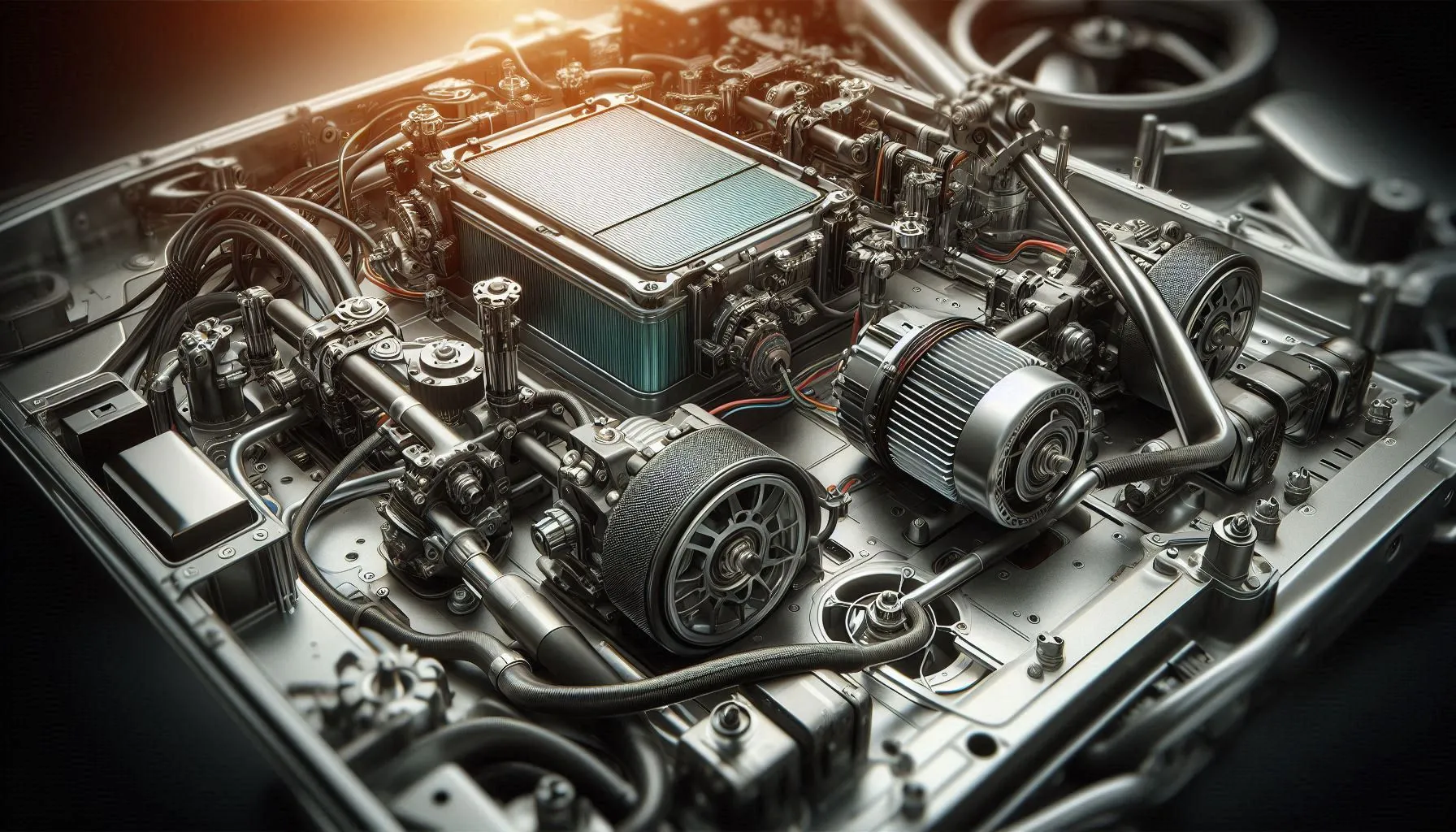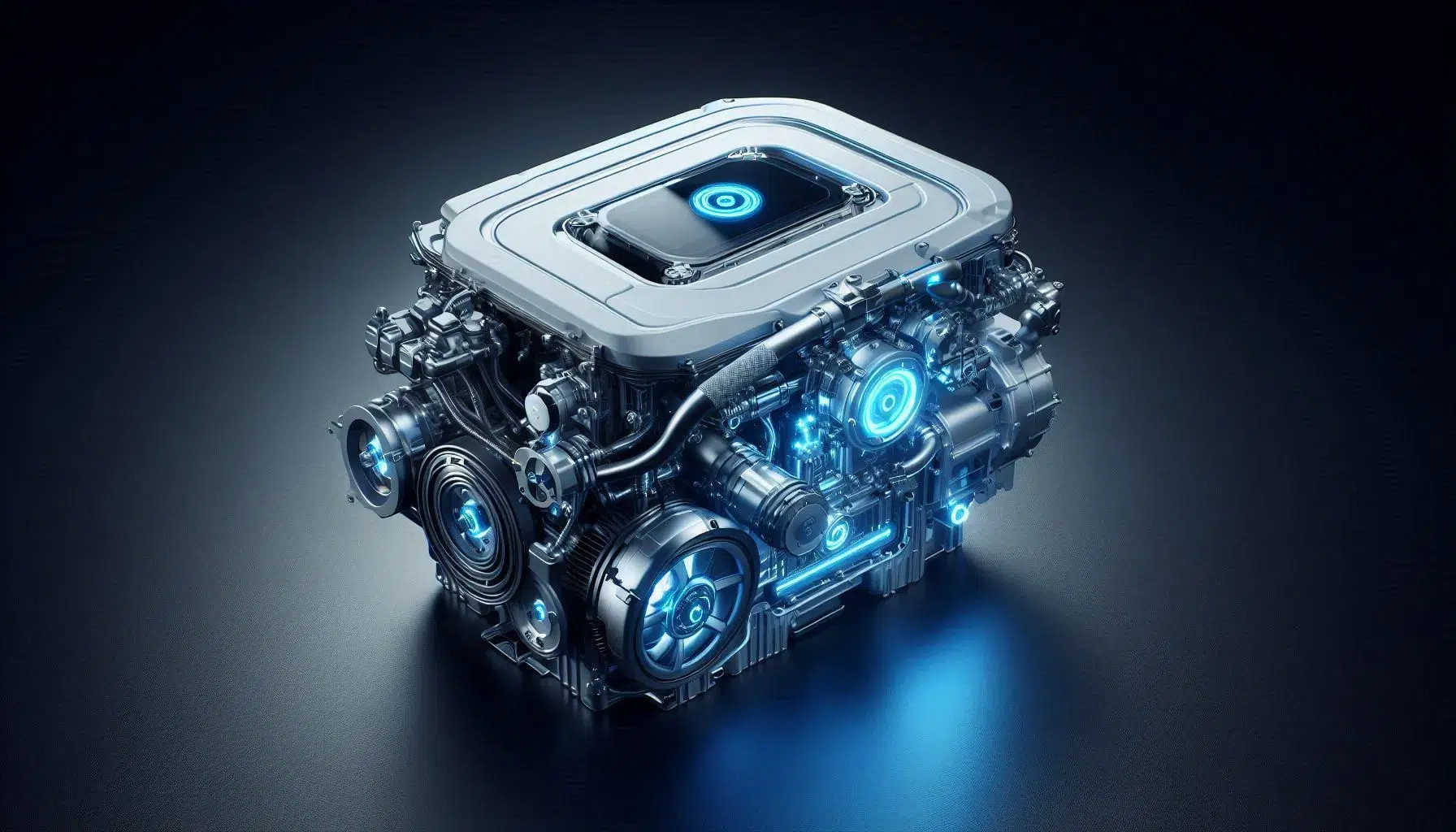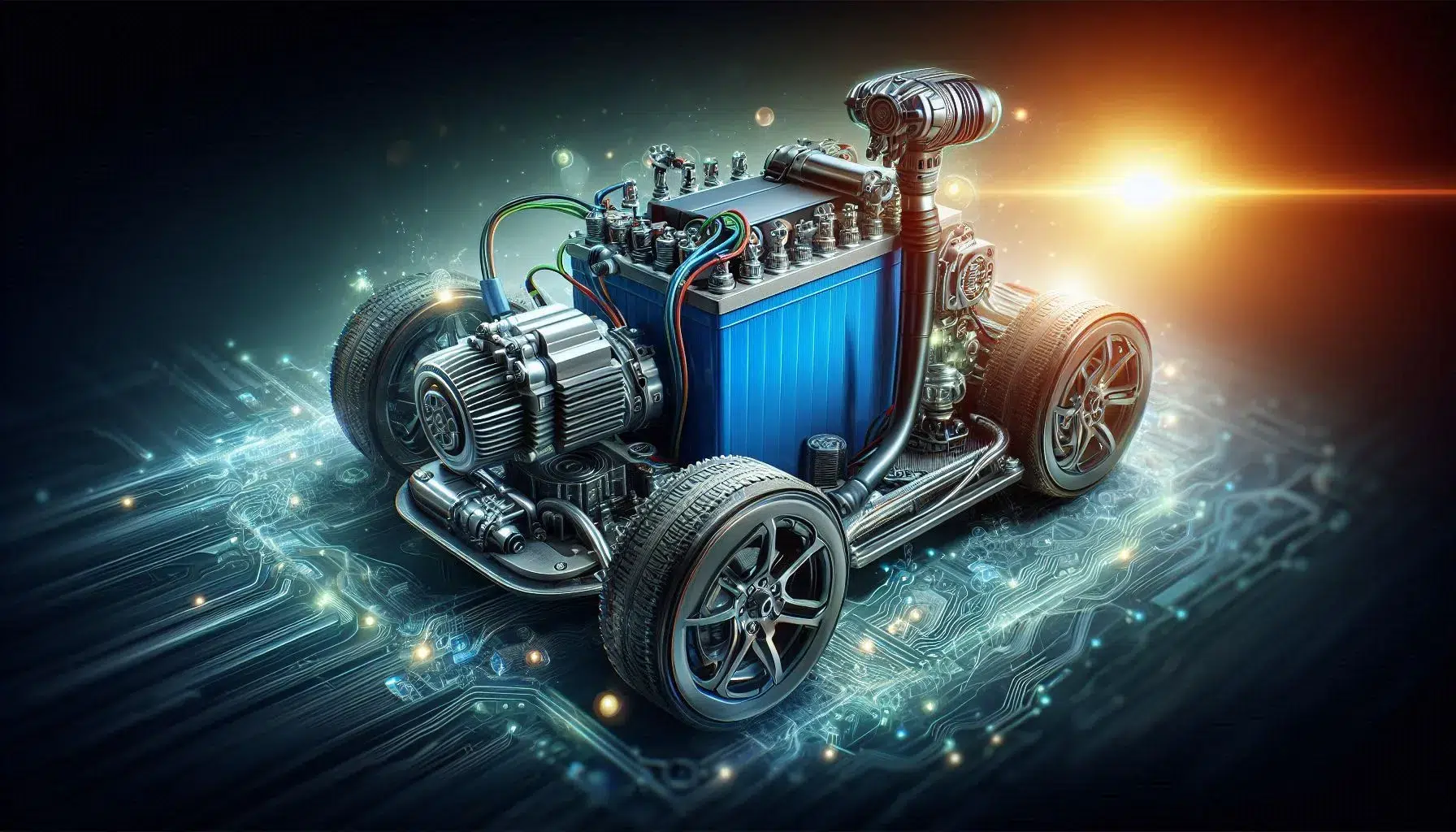Introduction to Hybrid Engines
Hybrid engines represent a significant technological advancement in the automotive industry, merging traditional internal combustion engines with electric motor systems. This innovative combination is designed to enhance overall vehicle performance while simultaneously improving fuel efficiency and reducing harmful emissions. The primary objective of hybrid technology is to create a more sustainable and eco-friendlier alternative to conventional vehicles, contributing positively to the evolving automotive landscape.
The fundamental concept behind hybrid engines is that they leverage the strengths of both an internal combustion engine and an electric motor. These vehicles can operate using one power source independently or a combination of both, depending on driving conditions. In most hybrid systems, the internal combustion engine provides power during high-demand scenarios, such as quick acceleration, while the electric motor operates during lighter driving conditions, like cruising. This dynamic operation allows hybrid engines to achieve better fuel economy compared to their conventional counterparts.
Hybrid technology has gained traction due to its capacity to address pressing environmental concerns. As countries worldwide implement stricter emissions regulations, the demand for vehicles that can lower carbon footprints is on the rise. By utilizing hybrid engines, automakers create vehicles that not only meet these regulatory standards but also cater to consumer preferences for efficiency and sustainability. These combined elements crucially influence the future of hybrid engines, which are anticipated to play a critical role in the ongoing shift towards more environmentally responsible transportation solutions.
Advancements in Hybrid Technology
The automotive sector is currently experiencing significant advancements in hybrid technology, with innovative models such as the Toyota Grand Highlander Hybrid and the Hyundai Santa Fe Hybrid demonstrating how the future of hybrid engines is evolving. These vehicles encapsulate the latest trends in efficiency, performance, and environmental sustainability.
The Toyota Grand Highlander Hybrid represents a remarkable leap in hybrid technology, showcasing a sleek design paired with impressive capabilities. This model is equipped with a high-output hybrid powertrain, integrating a robust gasoline engine with an electric motor. Together, they deliver exceptional fuel economy without sacrificing power, achieving an estimated combined fuel efficiency of around 36 miles per gallon. Additionally, the Grand Highlander Hybrid emphasizes passenger comfort with generous space and cutting-edge technology features, including an advanced infotainment system, making it a versatile option for families and adventure seekers alike.
Similarly, the Hyundai Santa Fe Hybrid showcases the brand’s commitment to integrating hybrid technology across different vehicle categories. With a powerful hybrid setup that combines a turbocharged engine with an electric motor, the Santa Fe Hybrid offers swift acceleration and responsive handling, realizing a combined fuel efficiency of approximately 33 miles per gallon. What sets this model apart is its focus on driving experience and safety, featuring an array of advanced driver-assistance systems designed to enhance overall safety on the road. Additionally, the Santa Fe Hybrid emphasizes a spacious interior, prioritizing both passenger comfort and innovative storage solutions.
These recent models showcase the ongoing development in hybrid technology and the industry’s commitment to addressing evolving consumer needs. As the focus on sustainability continues to surge, vehicles like the Toyota Grand Highlander Hybrid and Hyundai Santa Fe Hybrid exemplify the promising future of hybrid engines, setting high standards and paving the way for what is to come in the automotive landscape.
Fuel Efficiency Improvements
Advancements in hybrid engine technology have significantly enhanced fuel efficiency, primarily driven by improvements in battery technology and sophisticated energy management systems. Modern hybrid vehicles utilize high-capacity, lightweight lithium-ion batteries that offer better energy density and longevity, enabling them to store and deliver more energy for propulsion. This increase in battery efficiency allows for extended electric-only driving ranges, which are crucial for reducing fuel consumption.
Regenerative braking is one of the pivotal technologies that contribute to the improved efficiency of hybrid engines. This system captures kinetic energy generated during braking and converts it into electrical energy, which is then stored in the vehicle’s battery. This process not only reduces wear on traditional braking systems but also allows for the recovery of energy that would otherwise be lost. As a result, hybrid vehicles can operate more effectively in stop-and-go traffic, where energy recovery is maximized.
Another critical component of hybrid engines is intelligent power distribution. Advanced energy management systems monitor the vehicle’s driving conditions and regulate the use of the internal combustion engine and electric motor to optimize fuel consumption. By intelligently switching between electric and gas power based on factors such as speed, acceleration, and battery state of charge, these systems ensure that the vehicle is operating at peak efficiency, thereby reducing overall emissions and fuel usage.
Furthermore, the integration of predictive analytics in energy management systems is emerging as a game changer. These systems can take into account factors like traffic patterns and driving habits to establish an optimal operational strategy for hybrid engines. By enhancing how energy is distributed and utilized, automakers are paving the way for the future of hybrid engines, making them more fuel-efficient and environmentally friendly. As the technology continues to develop, hybrid vehicles are poised to become increasingly dominant in the automotive market, contributing to a more sustainable future.
Role of Hybrid Technology in Emissions Reduction
Hybrid technology plays a pivotal role in addressing the pressing issue of automotive emissions, which is critical as the world moves towards stricter environmental regulations and goals. By combining traditional internal combustion engines with electric propulsion systems, hybrid vehicles significantly reduce reliance on fossil fuels, contributing to a decrease in the overall carbon footprint.
Studies have shown that hybrid vehicles can achieve up to a 20% reduction in CO2 emissions when compared to their traditional counterparts. This reduction is primarily attributable to the efficient energy management systems that optimize fuel consumption. During low-speed driving, hybrids can operate on electric power alone, which results in zero tailpipe emissions. Additionally, regenerative braking systems capture energy that would otherwise be lost during braking and use it to recharge the vehicle’s battery, further enhancing energy efficiency.
The critical role of hybrid engines aligns seamlessly with global environmental goals, such as the Paris Agreement, which seeks to limit global warming to below 2 degrees Celsius. As countries strive to meet these ambitious targets, the automotive industry is under increasing pressure to adopt cleaner technologies. Consequently, hybrid technology presents a viable transition solution towards fully electric vehicles, allowing manufacturers to meet regulatory demands while catering to consumer preferences for longer driving ranges and reduced charging times.
Moreover, as nations implement stricter emissions regulations and provide incentives for low-emission vehicles, the integration of hybrid systems becomes increasingly attractive for both manufacturers and consumers. The evolution of hybrid engines, therefore, not only plays a significant role in emissions reduction but also drives the automotive sector toward a more sustainable future.

Regulatory Compliance
The automotive industry is undergoing significant transformations, primarily driven by the increasing stringency of emission regulations across the globe. Hybrid engines have emerged as a vital technology in helping manufacturers comply with these heightened standards. By combining internal combustion engines with electric propulsion, hybrid vehicles significantly reduce harmful tailpipe emissions, thereby aligning with global efforts aimed at mitigating climate change and enhancing air quality.
In many regions, regulatory frameworks such as the European Union’s stringent CO2 emissions targets compel manufacturers to rethink their vehicle lineups. The integration of hybrid engines allows automakers to meet these challenging requirements while still providing consumers with a viable alternative to traditional gasoline and diesel vehicles. With advances in technology, many hybrid systems now achieve emissions far below the mandated thresholds, positioning them as a favorable option in the regulatory landscape.
Moreover, hybrid vehicles contribute to lower fuel consumption, which directly influences greenhouse gas emissions. As manufacturers strive to navigate these complex regulations, the future of hybrid engines seems promising. With governments worldwide implementing incentives for cleaner vehicle technology, hybrid engines not only support automakers in regulatory compliance but also foster consumer demand for environmentally friendly options.
Additionally, compliance with environmental laws is not just a matter of meeting current standards; it often requires adaptation to future legislations as well. As such, investment in hybrid technology may be viewed as a strategic approach for manufacturers. By promoting the development of cleaner, more efficient hybrid engines, companies can ensure their competitiveness in an evolving market and contribute to the collective aim of reducing environmental impacts.
Ultimately, the regulatory landscape plays a critical role in shaping the evolution and future of hybrid engines. As emission laws become increasingly rigorous, hybrid technology is likely to remain a central component in the strategy of automotive manufacturers committed to compliance and sustainability.
Future Trends in Hybrid Engines
The automotive industry is on the brink of significant transformation, driven by the ongoing electrification and hybridization of vehicle powertrains. The integration of electric power with traditional combustion engines is reshaping the future of hybrid engines. This transition is not merely a trend but a necessary adaptation to comply with stringent environmental regulations and the increasing demand for fuel-efficient vehicles. As manufacturers innovate, the complexity of hybrid systems is expected to increase, allowing for more efficient energy management, improved performance metrics, and reduced emissions.
One notable trend is the advancement of plug-in hybrid electric vehicles (PHEVs), which offer flexibility by allowing drivers to charge their vehicles while still benefiting from a combustion engine’s range. The future of hybrid engines will likely see a greater emphasis on PHEVs, enabling longer distances on electric power alone before relying on traditional fuel. Additionally, battery technology is advancing rapidly, reducing costs and improving energy density, thereby enhancing the overall performance and efficiency of hybrid powertrains.
Automakers are also exploring the concept of sophisticated hybrid systems that intelligently manage the distribution of power between electric motors and combustion engines. Future vehicle designs may incorporate features such as regenerative braking, which not only improves efficiency but also extends the lifespan of mechanical components. Moreover, the electrification trend will likely lead to a substantial reduction in dependency on fossil fuels, pushing the automotive industry toward more sustainable practices.
The implications of these trends are profound, indicating that the future of hybrid engines is inherently linked to broader advancements in the automotive sector. As hybrid technologies evolve, manufacturers will need to adapt to these innovations, forecasting a shift in vehicle architectures and propulsion systems. Ultimately, the harmonious blending of electric and combustion technologies positions the automotive industry towards a more sustainable and efficient future.
Advanced Battery Technologies
The future of hybrid engines is closely tied to the development of advanced battery technologies, particularly solid-state batteries. These next-generation batteries are poised to revolutionize the hybrid vehicle landscape by addressing many of the limitations presently faced by traditional lithium-ion batteries. Solid-state batteries replace the liquid electrolyte found in conventional batteries with a solid electrolyte, resulting in numerous advantages that enhance the performance of hybrid engines.
One of the most significant benefits of solid-state batteries is their higher energy density. This characteristic enables hybrid vehicles to store more energy in a smaller, lighter package, which can substantially improve overall vehicle efficiency. Higher energy density not only extends the range of hybrid vehicles but also contributes to a lighter vehicle weight, ultimately enhancing performance and handling.
Additionally, solid-state batteries offer faster charging times, an essential factor for improving the practicality of hybrid vehicles. With the ability to charge more quickly than their lithium-ion counterparts, drivers will spend less time at charging stations, making hybrid vehicles more convenient for day-to-day use. This feature could encourage more consumers to adopt hybrid technology, further integrating it into the mainstream automotive market.
Another critical aspect is safety. Solid-state batteries tend to be less flammable and exhibit greater thermal stability compared to traditional batteries. This improved safety profile reduces the risks associated with battery failure, thereby reassuring consumers about the reliability of hybrid vehicles. Enhanced safety can lead to greater public acceptance and trust in hybrid technology, thereby positively influencing its market growth.
As these advanced battery technologies continue to evolve, the future of hybrid engines looks promising. Their potential to improve energy efficiency, reduce charging times, and enhance safety will undoubtedly reshape the capabilities of hybrid vehicles, positioning them as formidable contenders in the modern automotive landscape.
Challenges and Controversies
The future of hybrid engines has been the subject of numerous discussions, particularly regarding the challenges and controversies that accompany their adoption. One significant concern is the discrepancy in fuel consumption reported by manufacturers compared to real-world performance. Various studies have illustrated that several hybrid vehicles often exceed the fuel consumption figures provided by automakers, raising questions about their effectiveness as a solution for reducing carbon emissions and fuel costs. These discrepancies can stem from differences in testing environments versus real-life driving conditions, as well as the impact of driving habits and maintenance practices.
Another challenge pertains to the higher initial costs associated with purchasing a hybrid vehicle. While hybrids are designed to save fuel and reduce emissions, the upfront investment often surpasses that of conventional gasoline engines. This financial barrier can deter potential buyers, particularly in regions where fuel prices are low, making the more expensive hybrid model less attractive. Additionally, the technology that enables hybrid engines—such as advanced battery systems—can lead to complexities in maintenance and repairs. The integration of multiple power sources and the sophisticated electronics involved can result in higher servicing costs compared to traditional vehicles.
Moreover, the overall longevity and efficiency of hybrid technology can vary widely depending on usage patterns and environmental conditions. For instance, hybrids may perform exceptionally well in city driving, where frequent stops and starts optimizing fuel savings. However, in highway conditions, the fuel efficiency gains can diminish significantly, further complicating the narrative surrounding the future of hybrid engines. These complexities highlight the importance of ongoing research and development to address the challenges and enhance the reliability of hybrid vehicles as a long-term solution for sustainable transportation.

Conclusion
The exploration of hybrid engines has unveiled their significant role in the evolution of automotive technology. Throughout this guide, we have delved into the fundamental components and mechanics of hybrid engines, tracing their journey from inception to the current advancements that characterize this category of vehicles. Hybrid engines, by their very nature, represent a harmonious blend of traditional internal combustion technologies and innovative electric propulsion systems, marking a critical shift towards more sustainable driving solutions.
As discussed, the future of hybrid engines is rooted in ongoing innovations that focus on enhancing efficiency, reducing emissions, and improving overall driving experiences. Manufacturers are investing heavily in research and development, exploring advanced materials, battery technologies, and sustainable fuels. These advancements are poised to address pressing environmental concerns while catering to the evolving demands of consumers seeking greener alternatives. The convergence of hybrid engine technology with autonomous driving and connectivity features further paves the way for an integrated automotive ecosystem that prioritizes sustainability and efficiency.
Looking ahead, the potential for hybrid engines to redefine the future of personal and commercial transportation is immense. They not only contribute to cutting down greenhouse gas emissions but also offer drivers an enhanced experience through improved fuel economy and performance. The continuous enhancements in battery technologies and energy management systems will further bolster the appeal of hybrid vehicles, making them more accessible and user-friendly.
In light of the discussions presented, it becomes evident that hybrid engines will remain an integral part of the automotive landscape. Their evolution is not just about adapting to current trends; it is about leading the charge towards a cleaner and more efficient future in transportation. As we witness further developments in hybrid technology, it is clear that this transition is imperative for fostering a sustainable automotive environment.
